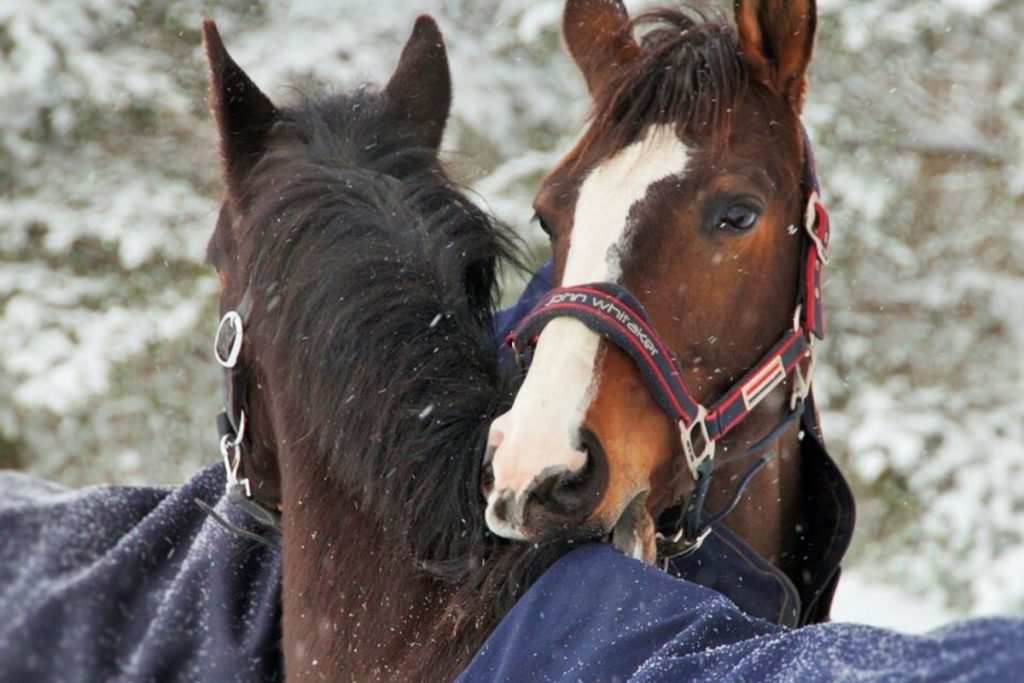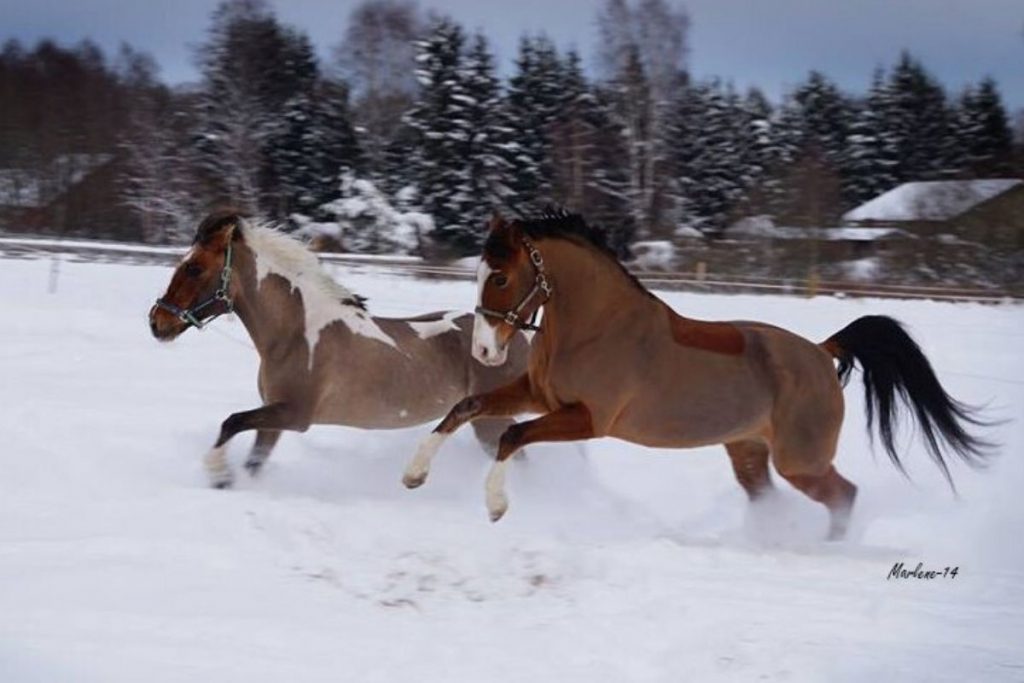Like all animals, horses require proper care from their owners. Horses have been domesticated for hundreds of years, so it is the responsibility of the horse owners to make sure that a horse has everything it needs to remain healthy and happy. Sometimes, those needs change. For instance, in the winter, horses need a bit more attention.
Do horses get cold in the winter? Yes, horses do get cold. They are hardy animals that can handle much colder temperatures than humans. However, there are some things that you need to provide for your horse during the winter to ensure that they remain warm, and they are:
- Extra food and water.
- Proper shelter.
- Blankets.
- Hoof maintenance.
While it is true that some horses handle the cold better than others, you should still provide more specific care to your horses in the winter. Read on to find out everything you need to know about caring for horses in the winter.
Caring for Horses in the Winter
According to the University of Minnesota’s College of Food, Agriculture, and Natural Resource Sciences, there are some precautions to take to ensure horses are cared for properly during the winter months.
Provide Extra Food and Water
Because a horse needs to work harder to stay warm in the winter, some biological processes need extra fuel to keep working. Therefore, more food should be provided to prevent weight loss. Hay is recommended for horses in the winter because high-quality hay helps the horse produce heat.
An adult horse can be expected to eat about two percent of its body weight in hay each day. This means a 1000 pound horse will consume 20 pounds of hay in a day.
Thomas Lenz, DVM says that for every 10-degree drop in temperature, a horse must increase their caloric intake by 15-20% to maintain its body heat and weight.
Horses also need extra water during the winter. In the summer, they receive a lot of moisture from the pastures as they graze, but in the winter, they eat dried food such as grain and hay.
Horses need extra water during winter to prevent dehydration and keep intestinal blockages from occurring. Horses gain energy from having proper levels of water intake, and this energy helps them maintain their warmth in the winter months.
Remember that snow is not a substitute for water. Make sure that your horse’s water does not freeze over and that they always have fresh water available.

Provide Shelter
A horse may be able to tolerate cold temperatures, but they should have access to shelter from storms, wind, sleet, and rain. Their winter coats work well to keep them warm but having shelter from wet weather and wind will help them retain the warmth. Stables and sheds work well, and trees and groves are suitable windbreaks in some cases.
Without shelter, a horse can tolerate temperatures down to zero degrees. On the other hand, with an available shelter, a horse can be fine in temperatures as low as 40 below zero.
Blankets
A horse’s coat is its natural blanket, and if a horse is blanketed before the winter coat comes in, it may prevent the winter coat from forming to its full potential. If that happens, you may find yourself with a horse unable to withstand colder temperatures.
However, there are times when a horse does need a blanket, and they include:
- During wet weather
- If a horse has their coat clipped short
- If they are very young or very old
- If they are not acclimated to cold weather
- If adequate shelter is not available
If a blanket must be used, it is crucial to use the blanket correctly to ensure the horse stays warm.
- Check the fit of the blanket to avoid sores.
- The blanket should be removed every day to check for damage and to ensure proper positioning.
- Change the blanket if it becomes wet.
- Dry your horse if it is wet before putting on the blanket.
Hoof Maintenance
During the winter, a horse may develop ice build-up in their hooves. This makes it challenging for them to walk and increases the likelihood that they could slip and fall. Their hooves should be picked regularly to remove compacted snow. Horses who are barefoot, rather than shod, have better traction in the winter.
How Cold Is Too Cold?
According to Dr. Bill Vandergriftt from the Retired Racing Horse Project, a horse is fine with cold weather, but the combination of cold weather and wet weather presents a problem. Furthermore, a mature horse in good health will tolerate colder weather better than a young horse or an elderly horse.
Horses tend to be most comfortable in temperatures that range from 18 degrees to 59 degrees. According to Kathy Anderson, with the University of Nebraska, a horse’s lower critical temperature is what you must worry about.
When temperatures are average, a horse doesn’t need to do much to maintain their body temperature. As the temperature lowers, the horse reaches their lower critical temperature. The lower critical temperature is dependent on factors such as their hair coat, overall health and physical condition, and age.
As a horse reaches their lower critical temperature, they have to work harder to stay warm. The following chart tells the lower critical temperature for different horses according to their coat of hair.
| Coat of Hair on Horse | Lower Critical Temperature (Fahrenheit) |
| Short or wet hair | 60 degrees |
| Moderate | 50 degrees |
| Heavy | 30 degrees |
The Formation of Winter Coats
A horse will naturally begin to form a winter coat when it becomes colder outside. This winter coat is a natural blanket for a horse. It traps air, warms it, and keeps it close to the body as insulation. However, if the horse becomes wet, the hair will lose some of its ability to warm the air and heat will be lost.

What About Hot-Blooded and Cold-Blooded Horses?
Hot-blooded horses do not have blood that is any warmer than any other horse. They are considered hot-blooded because of their breed classification. Hot-blooded horses tend to come from the Middle East and are bred for agility, elegance, and speed. They tend to have thinner skin and long legs.
Cold-blooded horses are heavier horses that are bred to work, and they are strong and muscular. Cold-blooded horses are bred in colder climates and tend to tolerate cold weather better than hot-blooded horses.
According to Cristine Barakat with Equus magazine, researchers in Norway discovered that how a horse responds in cold weather has a bit to do with whether or not they are hot- or cold-blooded, but there are other factors as well.
Researchers discovered that individual characteristics were the deciding factor in whether or not horses get cold in the winter. For example, a hot-blooded horse in good health with a winter coat might be better able to cope with cold weather compared to a cold-blooded elderly horse.
To Conclude
While horses do get cold in the winter, they are still able to remain warm outside. By taking into consideration the type of horse you have and the condition of their coat, you can get an indication of how much cold they can tolerate.
Once cold temperatures arrive, your horse needs more calories to keep itself warm, and adjustments to food and water will help your horse heat up its internal furnace. With extra shelter in place and blankets on hand, a horse can survive the cold temperatures very well.
